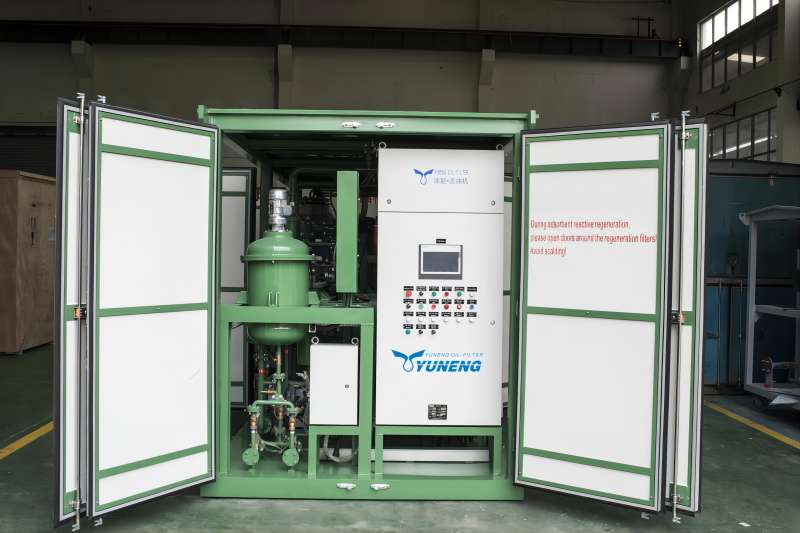Why Regenerated Transformer Oil Is Important for Reliable Power Solutions
The important function of regenerated transformer oil in ensuring the dependability of power systems can not be overstated. By restoring the oil's integral chemical and physical residential or commercial properties, the regeneration procedure dramatically improves its dielectric toughness and thermal efficiency.
Value of Transformer Oil
Transformer oil plays an important duty in the effective procedure of electric transformers. This specific oil offers multiple features, largely as an insulator and coolant, making sure the secure and reliable performance of transformer systems. Its dielectric homes avoid electrical discharges, thus securing the honesty of transformer components. By offering thermal conductivity, transformer oil dissipates heat produced throughout electrical procedure, which is necessary for preserving optimum operating temperature levels and lengthening the lifespan of the equipment.
Additionally, transformer oil works as an obstacle versus moisture and air, which can cause oxidation and deterioration of transformer materials. The presence of pollutants in the oil can dramatically hinder its insulating homes, resulting in functional inefficiencies and prospective tools failure. Regular monitoring and maintenance of transformer oil are as a result critical to guaranteeing the continued effectiveness of transformers.
The quality and composition of transformer oil are critical, as they straight impact the reliability and efficiency of the electrical systems in which they operate. Comprehending the significance of transformer oil is necessary for utilities and industries reliant on durable power facilities, highlighting the requirement for reliable monitoring and regrowth processes to maintain oil honesty with time.
Benefits of Regrowth Process

Furthermore, the regrowth procedure mitigates the deterioration of oil, which can bring about boosted oxidation and acid development. This not just boosts the reliability of the oil however additionally decreases the risk of transformer failures due to insulation malfunction. The enhanced quality of regenerated oil enables transformers to operate at optimal levels, eventually causing boosted power performance and reduced functional prices.
Additionally, the regeneration process adds to keeping the overall health and wellness of the power system. Transformers can run longer without the requirement for oil substitute, hence lessening downtime and upkeep efforts. In summary, the regrowth process offers considerable benefits by enhancing the longevity and performance of transformer oil, ensuring that power systems operate accurately and effectively in time.
Ecological Influence and Sustainability
The regrowth procedure of transformer oil considerably eases ecological issues linked with oil disposal and waste monitoring. Typical disposal techniques for utilized transformer oil pose considerable threats, consisting of soil contamination and water pollution. By regenerating oil, these threats are considerably reduced, as the procedure recycles existing sources rather than contributing to squander accumulation.
Additionally, regenerated transformer oil can be recycled in different applications, which advertises a circular economic climate. This not only reduces the requirement for virgin oil removal-- a process that can be environmentally harmful-- however also preserves natural sources. The regrowth procedure itself employs sophisticated filtration and filtration methods that remove hazardous impurities, guaranteeing that the end product goes beyond or fulfills industry requirements for performance and safety.

Enhancing Transformer Performance
Considerable enhancements this website in transformer efficiency can be achieved through making use of regenerated transformer oil. This oil, created via advanced purification procedures, significantly improves the electrical insulation homes of transformers. By eliminating pollutants and contaminants that typically compromise performance, regrowed oil makes sure remarkable dielectric toughness, reducing the risk of electrical failures.
In addition, regenerated transformer oil shows boosted thermal conductivity, which facilitates efficient heat dissipation. This particular is essential for preserving ideal operating temperature levels, thereby extending the life expectancy of transformers and reducing the likelihood of overheating - Reclaimed Transformer Oil. Boosted thermal monitoring additionally adds to the general dependability of power systems
Furthermore, the chemical stability of restored oil protects against the development of harsh acids and sludge, which can negatively influence transformer components. By preserving a cleaner internal environment, this oil decreases upkeep demands and prolongs service periods.
Cost-Effectiveness and Performance
In terms of cost-effectiveness and performance, restored transformer oil presents an engaging alternative to conventional oils. The regeneration procedure not only gets rid of impurities yet also recovers the oil's original residential properties, extending its useful life expectancy. This longevity equates into lowered regularity of oil replacement, thereby reducing functional expenses over time.
Additionally, using restored oil news can considerably decrease power losses connected with ineffective shielding liquids. Its remarkable dielectric homes make certain ideal efficiency, improving the reliability of power systems. Consequently, services gain from lower maintenance expenses and lowered downtime, fostering a more effective functional environment.

Conclusion
To conclude, the regeneration of transformer oil plays a crucial duty in guaranteeing the reliability and efficiency of power systems. By bring back the crucial chemical and physical homes of the oil, this procedure boosts dielectric strength and thermal conductivity, ultimately decreasing the danger of insulation failure. The environmental benefits linked with reusing resources contribute to sustainability efforts, while cost-effectiveness and improved performance underscore the need of making use of regenerated transformer oil in modern-day electrical facilities.
Transformer oil plays a critical duty in the reliable procedure of electric transformers. his explanation Normal monitoring and maintenance of transformer oil are for that reason important to guaranteeing the proceeded efficiency of transformers.
The regrowth process of transformer oil significantly relieves ecological worries linked with oil disposal and waste administration. By extending the lifecycle of transformer oil, the energy and sources commonly consumed in creating brand-new oil are substantially reduced.Substantial renovations in transformer efficiency can be achieved with the use of regenerated transformer oil.
Comments on “The Science Behind Effective Transformer Oil Regeneration Plants”